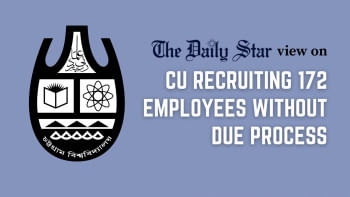Era of complacency must come to an end

Public universities in Bangladesh symbolise the collective ambition for intellectual growth and societal betterment. However, recent revelations have shaken this perception, laying bare a troubling reality of systemic corruption and irregularities which taint the integrity of these institutions. Despite being entrusted with the mission of nurturing minds and propelling research, certain university administrations, particularly the vice-chancellors, stray from their path. Many have become ensnared in a labyrinth of political intrigue and financial impropriety.
Those who have breached public trust must be held accountable for their actions. Only through steadfast commitment to the principles of integrity and fairness can we aspire to revive the noble ideals upon which our universities were established. The era of complacency must come to an end; the time for decisive action is upon us.
Most recently, Chittagong University finds itself engulfed in a morass of unjust and irregular activities, prompting a year-long protest by the teachers' association, calling for the resignation of both the vice-chancellor and pro vice-chancellor. The tenure of Vice-Chancellor Dr Shireen Akhter was fraught with a series of controversial and irregular appointments, casting significant doubt upon the integrity of the selection process. The now-former vice-chancellor oversaw at least 172 recruitments without adhering to mandatory advertising protocols or considering the needs of specific departments. Under her leadership, CU seemed to devolve into a mere job market, where appointments were handed out with alarming frequency and little regard for meritocracy. The institution, once revered as a beacon of learning, appeared to be reduced to a mere pawn in a game of patronage and self-interest.
The media landscape bore witness to this spectacle, with reports and exposés documenting the commodification of positions within the university hierarchy. For the past four years, news outlets have diligently chronicled the exploitation of the institution for personal gain, capturing the narrative through compelling audio-visual representations.
In protest against numerous transgressions, the Chittagong University Teachers' Association (CUTA) has persistently demonstrated for the past one year, calling for the resignation of both the vice-chancellor and the pro vice-chancellor. They organised a month-long exhibition showcasing reports of corruption and irregularities published in various newspapers. Eventually, a new vice-chancellor was appointed and the implicated vice-chancellor was removed from office. While the appointment of a new vice-chancellor and a new pro vice-chancellor represent a positive step forward, these remain insufficient in addressing the deep-rooted systemic issues plaguing the institution.
Meanwhile, the recent legal steps taken in response to allegations of corruption at another public university are commendable. At Rajshahi University of Engineering and Technology (RUET), the appointment process for 17 officers and employees faced significant scrutiny. Acknowledging the gravity of these allegations, the Anti-Corruption Commission (ACC) approved a case against both the former vice-chancellor and acting registrar of RUET, signalling a resolute stance against malpractice within a public educational institution.
Taxpayer funds, earmarked for the advancement of knowledge and the betterment of society, must not be squandered on corrupt practices. It is intolerable that educational institutions operate with impunity, shielded from consequences for their malfeasance. To rekindle faith in our education system, authorities must ensure that perpetrators of corruption face the full force of legal repercussions. Urgent and impartial investigation into the alleged misdeeds of past administrations are also crucial. Justice must be served clearly, with those implicated in corruption held accountable regardless of their status or influence. Anything short of this risks further eroding of public trust in our educational institutions and the rule of law itself.
Dr Ala Uddin is professor of anthropology at Chittagong University. Reach him at [email protected]
Views expressed in this article are the author's own.
Follow The Daily Star Opinion on Facebook for the latest opinions, commentaries and analyses by experts and professionals. To contribute your article or letter to The Daily Star Opinion, see our guidelines for submission.

 For all latest news, follow The Daily Star's Google News channel.
For all latest news, follow The Daily Star's Google News channel. 










Comments